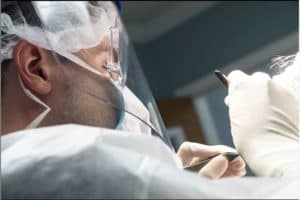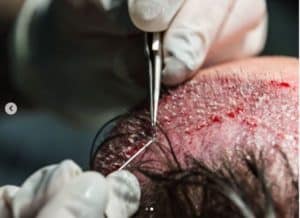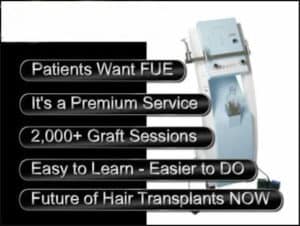Should You Travel for Hair Transplant Surgery?
Choosing a hair transplant clinic is a big decision. Patients have a limited amount of donor hair — on the sides and 
Is Traveling for a Hair Transplant Necessary?
Is traveling for a quality hair transplant always necessary? No, it is not. If you are fortunate enough to live near a proven hair transplant institute, you do not need to travel. But what if you don’t? Is it okay to go to the local doctor who just bought the new miracle hair transplant “machine” or the general cosmetic surgeon who just “added” hair transplant surgery to their menu of aesthetic services?

Dr. Bloxham performing an FUT harvest.
To answer this, it is important to understand the difference between an “institute” hair transplant clinic and a part-time, non-specialized hair transplant clinic. Institute clinics are offices dedicated solely to hair transplant surgery. These offices focus exclusively on hair restoration surgery, and do not offer other cosmetic services like liposuction, dermal fillers, etc. These facilities are large and well-equipped. The doctors operating these clinics are capable of performing both the FUT (Follicular Unit Transplantation or “strip”) technique and the FUE (Follicular Unit Excision) technique. These doctors also train, maintain, and continually monitor a large staff of in-house, hair transplant “super” technicians. These technicians work exclusively for the clinic and do not travel or contract with other clinics. They have years of experience and are capable of precisely

A super technician carefully placing follicular unit grafts.
dissecting and placing hundreds of follicular unit grafts per surgery. Institute clinics use one super technician for every 400 – 600 grafts, meaning the clinic must employee a minimum of 6 technicians to use in refined FUT mega-session procedures (2,500 grafts or greater). And while on the subject, the ability to perform gold-standard FUT mega-session procedures is a hallmark of hair transplant institutes. Most importantly, however, these clinics have the results! True hair transplant clinics produce excellent results on a regular basis. The results should feature large graft numbers, be completely natural, and be displayed in both HD photograph and video format.
These institute clinics differ significantly from “newer” hair transplant clinics or offices who simply “offer” hair restoration. These non-institute clinics are, as stated above, typically new to the hair transplant field. They often entered the field recently after purchasing a “miracle” hair transplant machine, particularly a robotic or automated FUE device. These clinics often claim that their “state-of-the-art” machines make up for a lack of experience or a minimal staff. This is untrue. There are no short-cuts in hair transplantation, and a machine in amateur hands will create amateur results. These clinics typically do not offer hair transplantation exclusively. The waiting room will often be filled with patients waiting for dermal “injections,” hair removal, or consultations for breast augmentation, liposuction, or other cosmetic services. These clinics also typically do not employee super technicians. These types of technicians are difficult to find and train, and expensive to maintain. Because these clinics usually do not perform a high volume of hair transplant surgeries, they cannot hire, train, and retain quality staff. To get around this, they will hire “traveling” or contracting technicians. These are non-licensed professional who, illegally, travel to different hair transplant clinics to participate in surgery. These technicians have no standardized training, do not work together on a daily basis, and have no responsibility to the clinic or the patients at this clinic. Furthermore, doctors at non-institute clinics often place the burden of surgery — again, illegally — on these technicians and play very little role in the procedure itself. These clinics often only offer FUE and are incapable of performing large surgeries. These clinics usually have very few published results. The results are often somewhat unclear or obscured and sometimes even taken from other clinics or from the manufactures of the “miracle” FUE tools they buy. Good luck finding detailed video results from these clinics.

Advertisement encouraging new doctors to buy the “miracle” machine and offer FUE hair transplant surgery.
This is what you need to look for in a clinic. If you have a clinic near you that sounds like an “institute” clinic, you should see them for a consultation. Chances are the consultation will feel “right,” you will get the right “vibe” from the clinic, and you can safely undergo a procedure at this clinic without traveling. If all the clinics near you feel more like the non-institute clinic, you may want to broaden your search and consider traveling. Unfortunately, the newer, lower quality clinics greatly outnumber the institute clinics. Most patients will probably find themselves surrounded by those who “offer” hair transplants, but somewhat further away from those who specialize in hair transplant surgery. This means most will need to travel a little bit. Even if it is just to a different city in your state or a surrounding state. Most institute clinics treat a large number of out-of-state and even international patients on a weekly basis, and will have protocols in place to help with travel and follow-up appointments.
In Conclusion …
So, should you travel for a hair transplant? Well, that depends. If you are near an institute-level clinic, then you likely have the luxury of undergoing a procedure locally. If the local clinics near you seem new, inexperienced, tout a miracle machine, use traveling technicians, or only offer hair transplant part-time, you may need to do some research and travel to a hair transplant institute. Remember, you only get one donor area and one scalp; and hair transplants are permanent. Do your research and find the right clinic — whether they are local or require a little bit of travel.
________
Dr. Blake Bloxham
Feller & Bloxham Medical, PC





